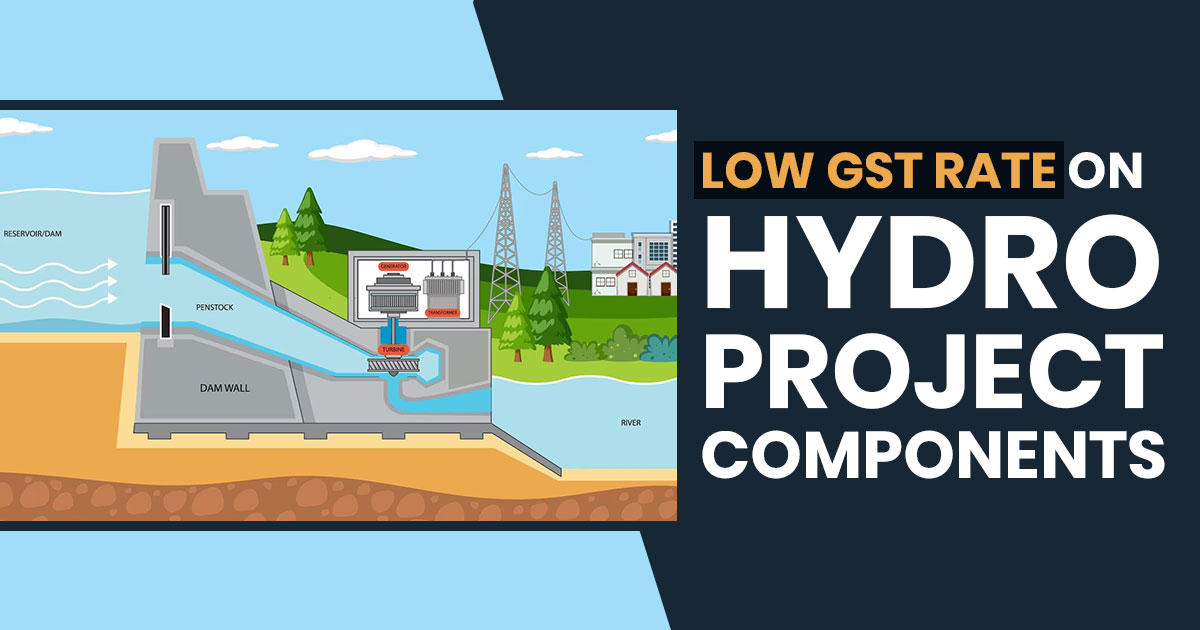
The Ministry of Power in the union government is considering requesting a reduction in the goods and services tax (GST) applied to the various parts used in hydropower projects.
The ministry is contemplating lowering the GST rates for items such as turbines, steel, and cement, which currently fall under higher tax brackets.
This proposal has been under discussion during a recent ministry meeting, and there is a possibility that it will be raised with the finance ministry. The Central Electricity Authority (CEA) has also placed a case for a reduction in GST rates.
Since the tax rate on these components is currently set at 18% or higher, the crucial goal is to bring these levies below the 18% threshold. The proposal to the finance ministry would recommend reclassifying these items into the 5% GST slab, as stakeholders recommended.
For turbines and steel, the GST rate is currently 18%, while cement falls under the highest slab with a 28% GST rate.
Related: RJ AAR: Cement and Steel Made Precast Manhole Will Attract 18% GST
The push for reducing GST rates coincides with the ministry’s ongoing preparation of a new hydropower policy, soon to be presented to the union cabinet for approval. This policy includes provisions for granting central funds of approximately Rs 4,000 crore to northeastern states with substantial hydropower potential, enabling them to invest in hydropower projects.
Furthermore, the policy aims to streamline tariff structures. The proposal to lower GST rates is also aligned with the broader objective of reducing tariffs, among other goals.
It’s worth noting that inquiries directed to the ministries of power and finance have not received responses as of the time of this report.
As part of its ambitious plan to achieve a renewable energy capacity of 500 GW by 2030 and attain net-zero carbon emissions by 2070, the Ministry of Power has been actively exploring strategies to reduce tariffs and stimulate investments. As reported by Mint on June 27th, the ministry is contemplating the possibility of recommending a significant reduction in the Goods and Services Tax (GST) applied to grid-scale battery storage, potentially lowering it to 5%.
Furthermore, this proposal to reduce GST rates comes at a time when the government is making efforts to revive numerous stalled hydroelectric projects that are privately owned. In the preceding month, a total of 12 dormant hydropower projects in Arunachal Pradesh, collectively possessing an installed capacity exceeding 11 GW, were transferred to state-run hydropower entities, namely NHPC, NEEPCO, and SJVNL. These projects had remained dormant for over 15 years.
Presently, the installed hydropower capacity in the country stands at 52 GW, with an additional 18 GW in the development pipeline. The government’s objective is to escalate the hydropower capacity to 78 GW by 2030, constituting a vital component of the overarching goal of achieving 500 GW of green power capacity.
Numerous hydropower initiatives are either being developed or are in the planning phase in the border regions of Arunachal Pradesh and the union territory of Jammu & Kashmir.
In the latter part of the previous year, NHPC Ltd, a government-owned entity, presented a preliminary feasibility report to the Central Electricity Authority (CEA) for the Upper Siang multipurpose storage project, aiming to create the largest hydropower venture in the country with a massive capital expenditure of Rs 1.13 trillion.
This endeavour, coupled with various other hydroelectric ventures along the Brahmaputra River in Arunachal Pradesh, is part of India’s strategy to offset China’s water diversion efforts.
India’s northern neighbour, which has frequently engaged in disputes with India, particularly since its incursions into Indian territory in 2020, has been constructing several dams upstream along the Brahmaputra River.
Read More: What If Electricity Comes Under GST India?
Hydropower plays a crucial role in India’s shift towards cleaner energy sources because solar and wind power generation can be inconsistent. Hydropower and pumped storage projects are anticipated to ensure a stable power supply, especially during nighttime or other periods of high demand.
The government is also considering the consolidation of major public-sector hydropower projects in the country. NHPC has already presented a proposal to merge the public sector hydroelectric companies THDC India Ltd and North Eastern Electric Power Corp. Ltd (Neepco) with itself, resulting in a merged entity with an estimated market capitalization of around Rs 70,000 crore.









